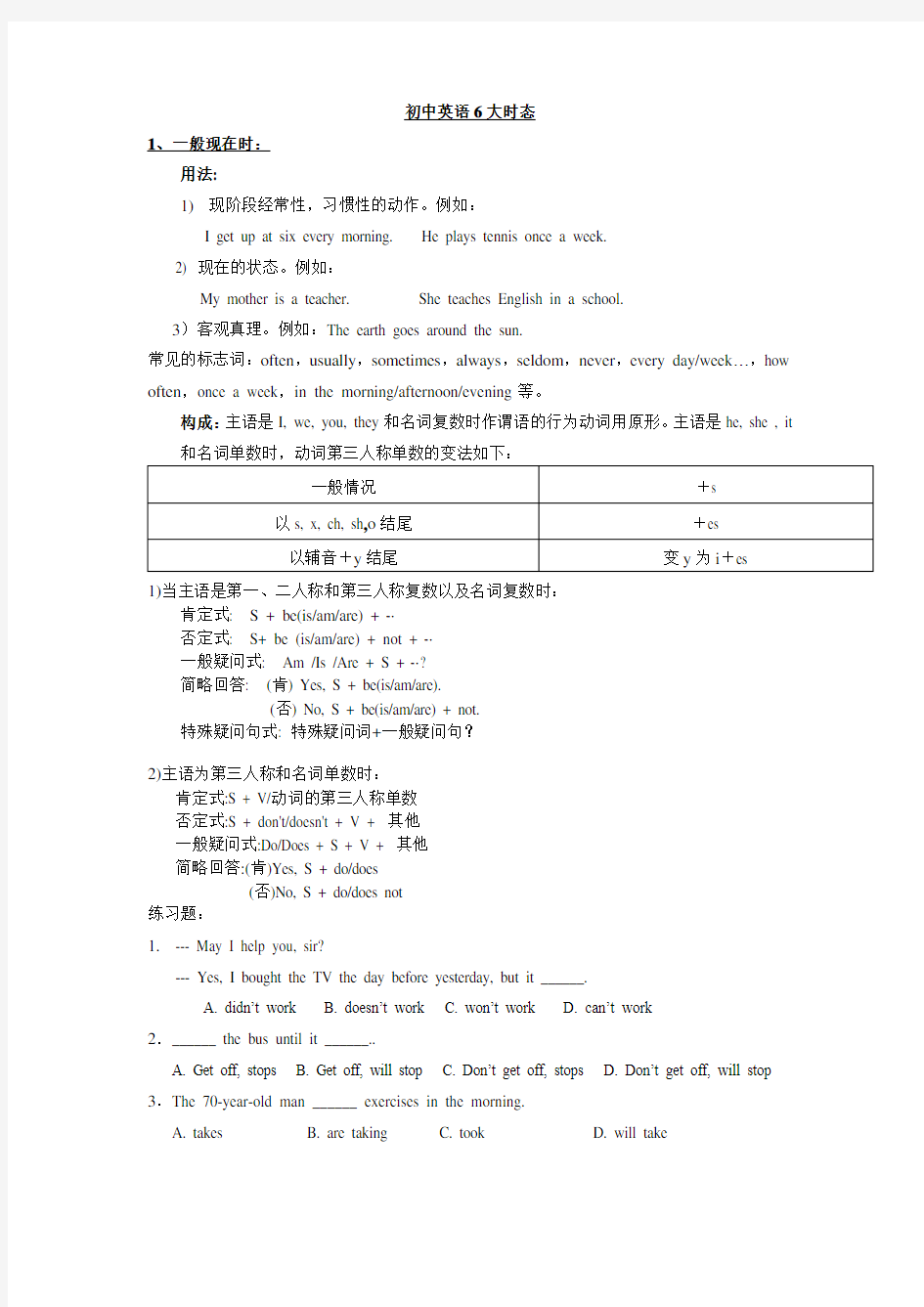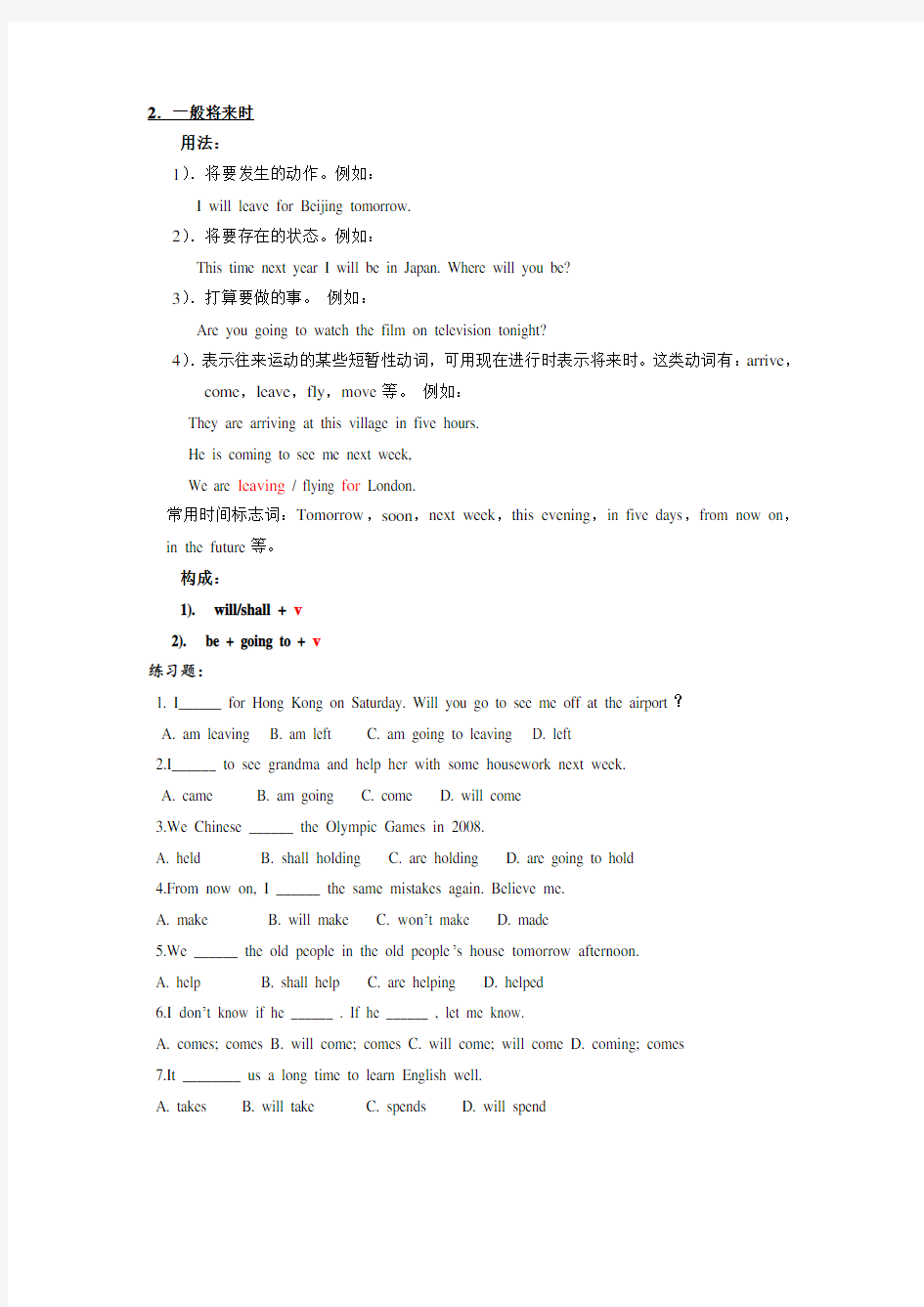(完整)初中英语6大时态


初中英语6大时态
1、一般现在时:
用法:
1)现阶段经常性,习惯性的动作。例如:
I get up at six every morning. He plays tennis once a week.
2) 现在的状态。例如:
My mother is a teacher. She teaches English in a school.
3)客观真理。例如:The earth goes around the sun.
常见的标志词:often,usually,sometimes,always,seldom,never,every day/week…,how often,once a week,in the morning/afternoon/evening等。
构成:主语是I, we, you, they和名词复数时作谓语的行为动词用原形。主语是he, she , it
1)当主语是第一、二人称和第三人称复数以及名词复数时:
肯定式: S + be(is/am/are) + ···
否定式: S+ be (is/am/are) + not + ···
一般疑问式: Am /Is /Are + S + ···?
简略回答: (肯) Yes, S + be(is/am/are).
(否) No, S + be(is/am/are) + not.
特殊疑问句式: 特殊疑问词+一般疑问句?
2)主语为第三人称和名词单数时:
肯定式:S + V/动词的第三人称单数
否定式:S + don't/doesn't + V + 其他
一般疑问式:Do/Does + S + V + 其他
简略回答:(肯)Yes, S + do/does
(否)No, S + do/does not
练习题:
1.--- May I help you, sir?
--- Yes, I bought the TV the day before yesterday, but it ______.
A. didn’t work
B. doesn’t work
C. won’t work
D. can’t work
2.______ the bus until it ______..
A. Get off, stops
B. Get off, will stop
C. Don’t get off, stops
D. Don’t get off, will stop 3.The 70-year-old man ______ exercises in the morning.
A. takes
B. are taking
C. took
D. will take
用法:
1).将要发生的动作。例如:
I will leave for Beijing tomorrow.
2).将要存在的状态。例如:
This time next year I will be in Japan. Where will you be?
3).打算要做的事。例如:
Are you going to watch the film on television tonight?
4).表示往来运动的某些短暂性动词,可用现在进行时表示将来时。这类动词有:arrive,come,leave,fly,move等。例如:
They are arriving at this village in five hours.
He is coming to see me next week,
We are leaving / flying for London.
常用时间标志词:Tomorrow,soon,next week,this evening,in five days,from now on,in the future等。
构成:
1). will/shall + v
2). be + going to + v
练习题:
1. I______ for Hong Kong on Saturday. Will you go to see me off at the airport?
A. am leaving
B. am left
C. am going to leaving
D. left
2.I______ to see grandma and help her with some housework next week.
A. came
B. am going
C. come
D. will come
3.We Chinese ______ the Olympic Games in 2008.
A. held
B. shall holding
C. are holding
D. are going to hold
4.From now on, I ______ the same mistakes again. Believe me.
A. make
B. will make
C. won’t make
D. made
5.We ______ the old people in the old people’s house tomorrow afternoon.
A. help
B. shall help
C. are helping
D. helped
6.I don’t know if he ______ . If he ______ , let me know.
A. comes; comes
B. will come; comes
C. will come; will come
D. coming; comes
7.It ________ us a long time to learn English well.
A. takes
B. will take
C. spends
D. will spend
用法:
1.过去发生的动作。例如:
The police stopped me on my way home last night.
2.过去存在的状态。例如:
They weren't able to come because they were so busy.
3. 常用于一般过去时的时间状语:
yesterday,three months ago,last year,in 1979,等。
构成:S+V-ed
动词的过去式。作谓语的行为动词的词尾变化如下:
一般过去时态的肯定句、否定句和疑问句形式(以be和like为例):练习题:
1.Mr. Mott is out. But he ______ here a few minutes ago.
A. was
B. is
C. will be
D. would be
2.---Hi, Tom.
---Hello, Fancy. I ______ you were here.
A.don’t know
B.won’t think
C. think
D. didn’t know
3. ---What did you do last night,Gina?
---I ______ Titanic 3D in the City Cinema.
A.watch
B. watched
C. am watching
D. will watch
4. ---Will Mary come to the party tomorrow?
---I’m not sure. She ______ an hour ago without saying anything,
A. has left
B. left
C. leave
D. will leave
5. After the students ______ their exams, they celebrated by having a party.
A. passed
B. failed
C. joined
D. gave
6. ---Is that your father speaking?
---Sorry, he isn’t in. He ______ abroad on business last month.
A. go
B. went
C. will go
D. has gone
4. 现在进行时
用法:
1)说话时正在进行或发生的动作(动作是在说话时正在进行)。例如:
She is waiting for a bus now.
2)现阶段正在进行或发生的动作(但是动作并不是必须在说话时正在进行)。例如:You are working hard today.
Kate wants to work in Italy, so she is learning Italian.
The population of the world is growing very fast.
3)频度副词always, forever等词连用时,表示不断重复或某种强烈的感情。如:
She is always smiling. He is always trying out new ideas. (表示欣赏,表扬)
4)表示按计划即将发生的动作(仅限于go, come, arrive, leave, start, fly, begin, stay 等动词)。如:
The party is beginning at 8:00 o’clock.
5)由while(when)引导的状语从句,动词通常用进行时。
While you are sitting on the grass, I’ll read you the novel.
常见时间标志词:now,at present,these days,look,listen,all the time,at the moment,be quiet等。
构成:Be + v-ing
肯定句:S + be + V-ing
否定句:S + be + not + V-ing
一般疑问句:Is(Are) + S + V-ing?
特殊疑问:wh_+ be + S + V-ing?
练习题:
1.They ______ ready for the coming test these days.
A. are getting
B. get
C. will get
D. got
2.Be quiet. All the workers ______.
A. sleep
B. are sleeping
C. will sleep
D. slept
3.Listen! Someone ______ at the door.
A. knocks
B. knocking
C. is knocking
D. knocked
5、过去进行时
概念:
1)过去某一阶段或某一时刻正在进行的动作。例如:
This time last year I was living in Brazil.
What were you doing at 10 o'clock last night?
常用于过去进行时的时间标志词:
at four yesterday afternoon,yesterday,then,all night, at that time/moment 等。
构成:was / were +v-ing
2)过去进行时与一般过去时的区别
过去进行时表示在过去一段时间正在进行的动作,而一般过去时表示一个完成的动作。如:
I was writing a composition last night. (可能没写完)
I wrote a composition last night. (已经写完)
练习题:
1)Daddy promised me he ______ me a computer
A. was bought
B. had bought C bought D. would buy
2)They said they ______ do some sports if it was fine.
A. were going to
B. went
C. would going
D. were going
3).The last time I __ Jane she ___ cotton in the fields.
A. had seen, was picking
B. saw, picked
C. had seen, picked
D. saw, was picking
4).I don ' t think Jim saw me; he ___ into space.
A. just stared
B. was just staring
C. has just stared
D. had just stared
5).I first met Lisa three years ago. She ___ at a radio shop at the time.
A. has worked
B. was working
C. had been working
D. had worked
6). The reporter said that the UFO ___ east to west when he saw it.
A. was traveling
B. traveled
C. had been traveling
D. was to travel
6、现在完成时
概念:
1)表示过去发生的动作对现在造成的影响或结果.常与already, just, ever, never, before等
词连用. 如:
She has never read this novel.
2)表示“过去的动作”一直延续到现在并有可能继续延续下去. 常与for (后跟段时间)或since (后跟点时间)等连用.如:
I have been a member of the Party for 10 years.
I have been a member of the Party since 10 years ago.
注:在有for 和since 引导时间状语的句子中不能用短暂性动词,应用与之相应的表示状态的词。如:
He has died for 3 years.(F)
He has been dead for 3 years.(T)
延续性动词与非延续性动词之间的转换:
leave → be away; borrow → keep; buy → have;
begin/start → be on; die → be dead;fall ill → be ill;
finish/end/stop→ be over; get up → be up;put on → wear;
come here → be here;go there → be there;become → be;
join → be in+组织机构或be a member of+组织机构;open/close sth → keep sth open/close catch/get a cold → have a cold;come back → be back fall asleep → be asleep;get to/ arrive/reach → be (in);wake up → be awake;
leave → be away from;get to know → know;
go (get) out → be out;catch a cold →have a cold;
go to school → be in school; go abroad → be abroad;
marry → be married; make friends with → be friends with;
lose → be lost /be missing /be gone; lose one's job /work → be out of work /a job
注:①现在完成时不能和表示明确的过去时间连用。如:in 1998, last morning等
②have/has been to 表示“去过”(去了又回来了)
have/has gone to 表示“去过”(去了没回来了)
如:Where has she gone?(句中所指的人不在)
Where has she been?(句中作指的人在)
构成:
have / has + v-ing
2)现在完成时态的肯定句、否定句和疑问句形式(以be和see为例):
肯定句:S+ have(has)+V-ed
否定句:S+ have(has)+not(haven’t,hasn’t)+V-ed
一般疑问句:Have(Has)+ S+V-ed+?
特殊疑问句:wh_+have(has)+ S+V-ed+?
练习题:
1.--How long ______ he ______ a fever?
--- Ever since last night.
A. have, got
B. have , had
C. have, caught
D. did, have
2.My bowl is empty. Who ______ all my soup?
A. drinks
B. had drunk
C. has drunk
D. drank
3. I ______ you for a long time. Where ______ you ______?
A. Didn’t seen; did, go
B. didn’t see; have, gone
C. haven’t seen; have, been
D. haven’t seen; have gone
4. The famous writer _____ one new book in the past two years .
A. is writing B.was writing C.wrote D.has written
5. —Our country ______ a lot so far .
—Yes . I hope it will be even ______ .
A. has changed ; well B. changed ; good
C. has changed ; better D. changed ; better
6. Zhao Lan ______already ______in this school for two years .
A. was ; studying B. will ; study
C. has ; studied D. are ; studying
7. We ______ Xiao Li since she was a little girl .
A. know B. had known C. have known D. knew
8. Harry Potter is a very nice film .I_______ it twice .
A. will see B. have seen C. saw D.see
9. —Do you know him well ?
— Sure .We _________ friends since ten years ago .
A. were B. have been C. have become D. have made
10. —How long have you ____ here ?
—About two months .
A. been B. gone C. come D. arrived
